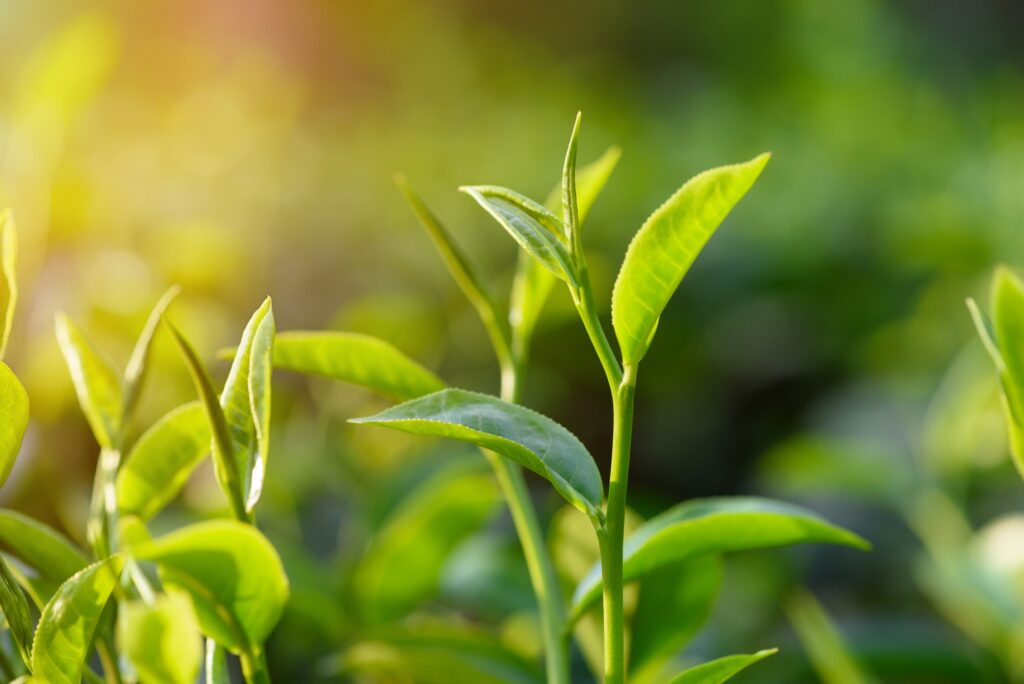
Welcome to the enchanting world of the black tea plant! While green tea often takes the spotlight in discussions about health benefits and iconic flavors, its cousin, black tea, has its own set of marvels waiting to be explored. In this article, we dive deep into the lesser-known aspects of the black tea plant – from its cultivation to the numerous health benefits it offers and the iconic flavors that excite your taste buds.
When it comes to cultivation, the black tea plant, scientifically known as Camellia sinensis, thrives in regions with moderate temperatures and high altitudes. It undergoes a unique processing method that involves withering, rolling, oxidizing, and drying the tea leaves, resulting in its distinct flavor and color.
Not only does black tea soothe the soul, but it also offers a range of health benefits. Packed with antioxidants, it aids in boosting heart health, promoting oral hygiene, improving digestion, and even enhancing focus and alertness.
Dive into the enchanting world of black tea with us as we uncover its hidden treasures – its cultivation, health benefits, and the iconic flavors that make it a tea lover’s paradise.
Cultivation of the Black Tea Plant
The black tea plant, scientifically known as Camellia sinensis, is a versatile plant that can be cultivated in various parts of the world. However, it thrives in regions with moderate temperatures and high altitudes. The plant requires well-drained soil and prefers a slightly acidic pH level. It is commonly grown in countries such as China, India, Sri Lanka, and Kenya.
The cultivation of black tea begins with the careful selection of tea bushes. Farmers choose cultivars that are known for their flavor profiles and ability to withstand the local climate conditions. The plants are usually grown from seeds or cuttings and take around three years to reach maturity.
Once the plants are mature, they are pruned regularly to encourage new growth and to maintain the desired shape and size. Proper pruning also helps in increasing the yield and quality of the tea leaves. The black tea plant is known for its ability to withstand harsh weather conditions, making it a resilient crop for farmers.
After the tea leaves have been harvested, they undergo a unique processing method that involves withering, rolling, oxidizing, and drying. This process is what gives black tea its distinct flavor and color. The withering stage involves allowing the tea leaves to wilt and lose moisture, while the rolling stage helps to shape the leaves and release their natural juices. Oxidation, also known as fermentation, is a crucial step that enhances the flavor and aroma of the tea. Finally, the tea leaves are dried to remove any remaining moisture, resulting in the production of black tea.
Different Varieties of Black Tea
Black tea comes in a wide variety of flavors and aromas, each with its own unique characteristics. Some of the popular black tea varieties include Assam, Darjeeling, Earl Grey, and Lapsang Souchong.
Assam black tea is known for its robust flavor and malty undertones. It is grown in the Assam region of India, which is known for its hot and humid climate. The tea leaves are dark and bold, producing a strong brew that is perfect for those who prefer a rich and full-bodied cup of tea.
Darjeeling black tea, on the other hand, is grown in the Darjeeling region of India, which is known for its cool and misty climate. It has a delicate and floral flavor with hints of muscatel. Darjeeling black tea is often referred to as the “Champagne of Teas” due to its exquisite flavor and limited production.
Earl Grey black tea is a popular variety that is flavored with bergamot oil. It has a citrusy and floral aroma, making it a favorite choice for tea lovers who enjoy a refreshing and fragrant cup of tea. Earl Grey is often enjoyed with a splash of milk or a slice of lemon.
Lapsang Souchong black tea is a unique variety that is known for its smoky flavor and aroma. It is produced by drying the tea leaves over pinewood fires, which imparts a distinct smoky flavor. Lapsang Souchong is a bold and robust tea that is often enjoyed on its own or with savory dishes.
Health Benefits of Black Tea
Not only does black tea soothe the soul, but it also offers a range of health benefits. Packed with antioxidants, it aids in boosting heart health, promoting oral hygiene, improving digestion, and even enhancing focus and alertness.
Black tea contains a group of antioxidants called flavonoids, which help to reduce the risk of heart disease by improving blood flow and preventing the oxidation of LDL cholesterol. Regular consumption of black tea has been linked to a lower risk of heart attacks, strokes, and other cardiovascular diseases.
The polyphenols found in black tea have antimicrobial properties that can help to prevent the growth of harmful bacteria in the mouth. This, in turn, promotes oral hygiene and reduces the risk of cavities and gum disease. Black tea is also known to freshen breath and prevent the buildup of plaque.
Black tea contains tannins, which are natural compounds that aid in digestion. These compounds help to stimulate the production of digestive enzymes, thereby improving the digestive process. Drinking a cup of black tea after a meal can help to alleviate digestive issues such as bloating and indigestion.
In addition to its physical health benefits, black tea also has cognitive benefits. The caffeine content in black tea can help to improve focus, alertness, and mental clarity. It can also enhance cognitive function and memory. However, it is important to consume black tea in moderation, as excessive caffeine intake can lead to negative side effects such as restlessness and insomnia.
Exploring the Iconic Flavors of Black Tea
One of the most exciting aspects of black tea is the wide range of iconic flavors it offers. From earthy and malty to floral and fruity, there is a black tea flavor to suit every palate.
Earthy flavors are commonly found in black teas from regions such as Assam and Yunnan. These teas have a robust and full-bodied taste with notes of malt and cocoa. They are often enjoyed with a splash of milk or a touch of honey.
Floral flavors can be found in black teas such as Darjeeling and Ceylon. These teas have a delicate and aromatic flavor with hints of flowers and muscatel. They are best enjoyed without any additions, allowing the natural flavors to shine.
Fruity flavors can be found in black teas that are flavored with fruits such as bergamot, peach, or raspberry. These teas have a sweet and refreshing taste, making them perfect for those who enjoy a fruity twist in their tea.
Spicy flavors can be found in black teas that are flavored with spices such as cinnamon, cardamom, or ginger. These teas have a warm and invigorating taste, making them ideal for chilly winter days.
Brewing Techniques for the Perfect Cup of Black Tea
To truly enjoy the flavors and aromas of black tea, it is important to follow the correct brewing techniques. Here are a few tips to help you brew the perfect cup of black tea:
- Start with fresh, cold water. Avoid using water that has been previously boiled or has been sitting in the kettle for too long, as it can affect the taste of the tea.
- Measure the right amount of tea leaves. The general rule of thumb is to use one teaspoon of loose tea leaves for every cup of water. Adjust the amount according to your taste preferences.
- Preheat your teapot or cup. Pour a small amount of hot water into the teapot or cup and swirl it around to warm the vessel. This helps to maintain the temperature of the tea as it brews.
- Steep the tea for the right amount of time. Different varieties of black tea require different steeping times. Generally, black tea should be steeped for around 3-5 minutes. Steeping for too long can result in a bitter taste.
- Strain the tea leaves. Once the tea has steeped for the desired amount of time, strain the leaves or remove the tea bag to prevent overbrewing.
- Serve and enjoy. Pour the brewed tea into cups and savor the delightful flavors and aromas of black tea. You can add milk, sugar, or lemon according to your taste preferences.
By following these simple brewing techniques, you can ensure that every cup of black tea is a memorable and enjoyable experience.
Black Tea in Traditional Medicine
Black tea has been used for centuries in traditional medicine to treat various ailments and promote overall well-being. In ancient Chinese medicine, black tea was believed to have cooling properties and was used to treat headaches, digestive issues, and even depression.
The antioxidants and polyphenols found in black tea have been shown to have anti-inflammatory properties, which can help to reduce inflammation in the body and alleviate symptoms of conditions such as arthritis. Black tea is also known to have a calming effect on the mind and body, making it a popular choice for those who suffer from anxiety or stress.
In traditional Ayurvedic medicine, black tea is often used to balance the doshas, or the body’s energy centers. It is believed to have a warming effect on the body and can help to stimulate digestion and improve circulation. Black tea is also used to detoxify the body and promote healthy skin.
While black tea should not be used as a substitute for medical treatment, incorporating it into your daily routine can provide a natural boost to your overall health and well-being.
Black Tea as a Culinary Ingredient
In addition to being a delightful beverage, black tea can also be used as a versatile culinary ingredient. Its unique flavors and aromas can add depth and complexity to a wide range of dishes.
Black tea can be used to infuse flavor into desserts such as cakes, cookies, and ice creams. The earthy and malty flavors of black tea pair well with ingredients such as chocolate, nuts, and spices. You can steep the tea leaves in milk or cream and use the infused liquid in your recipes.
Black tea can also be used to marinate meats and add a rich and complex flavor. Simply brew a strong cup of black tea and use it as a base for your marinade. The tannins in the tea will help to tenderize the meat and add a subtle smoky flavor.
For those who enjoy experimenting in the kitchen, black tea can be used to create unique cocktails and mocktails. Infuse the tea leaves in spirits such as vodka or rum to create a flavorful base for your drinks. You can also use brewed black tea as a substitute for other liquids in your cocktail recipes.
The possibilities are endless when it comes to using black tea in your culinary creations. Let your imagination run wild and explore the exciting flavors and possibilities that black tea has to offer.
Lesser-Known Facts about the Black Tea Plant
As we conclude our exploration of the black tea plant, here are a few lesser-known facts that will deepen your appreciation for this marvelous plant:
- The black tea plant, Camellia sinensis, is a member of the Camellia family, which also includes the tea plant’s cousins, Camellia japonica and Camellia sasanqua.
- The black tea plant is an evergreen shrub that can grow up to 6 feet tall. It has dark green leaves and produces small white flowers.
- The tea leaves of the black tea plant contain caffeine, which is a natural stimulant. However, black tea generally contains less caffeine than coffee, making it a milder alternative for those who are sensitive to caffeine.
- The black tea plant is believed to have originated in China and was later introduced to other parts of the world by explorers and traders.
- In addition to being consumed as a beverage, black tea leaves can also be used for various purposes, such as making natural dyes and insect repellents.
These lesser-known facts highlight the rich history and versatility of the black tea plant, making it an intriguing subject for tea enthusiasts and botany lovers alike.
The black tea plant is a true marvel, offering a delightful range of flavors, numerous health benefits, and a fascinating cultivation process. From its earthy and malty varieties to its floral and fruity flavors, black tea has something to offer for every tea lover. Whether you enjoy a cup of black tea for its soothing properties or its invigorating taste, it is clear that this beloved beverage holds a special place in the hearts of tea enthusiasts around the world. So, the next time you savor a cup of black tea, take a moment to appreciate the hidden treasures of the black tea plant and the wonders it brings to your teacup.






